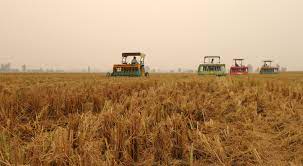PRANA to reach out to 2.5 lakh farmers to adopt no-burn cropping system by 2025
Author: BI Bureau

Amritsar: Lauding the efforts of the Punjab government and other stakeholders in crop residue management (CRM) in the state, Matt Brown, Managing Director of Global Conservation, The Nature Conservancy (TNC), on Monday said that they are striving to get at least 250,000 farmers over the next three years to adopt a no-burn cropping system in the state. This, Brown said, would be achieved by creating an enabling environment for farmers to deal effectively with the problem of crop residue burning.
Brown, who oversees TNC’s conservation programs in 59 countries across Africa, Asia Pacific, Europe, India, and Latin America, is on a week-long visit to India. During his visit, he also visited Amritsar to see the progress of TNC’s newly launched project PRANA (Promoting Regenerative and No-burn Agriculture).
Dr Annapurna Vancheswaran, Managing Director, TNC India, added: “PRANA aims to remove the barriers which are a hindrance to the successful adoption of residue management solutions by the farmers. The unique features of the project are its scale – reaching out to 250,000 farmers in 18 out of 23 districts of Punjab during the course of this project. It is a multi-stakeholder four-year project ending in June 2025. In the first year, we will be working through High Intensity Activity Clusters (HIAC) in two districts – Patiala and Moga and through Multi Component Implementation Approach (MCIA) in 10 districts.”
PRANA is aligned with the mandate of both the Union and state governments to move towards sustainable and regenerative agriculture and is hopeful that the project can change how farming has been practiced in Punjab, added Dr Vancheswaran. PRANA is also aligned with TNC’s global 2030 goals, which include sequestering three billion metric tons of CO2 emission annually, and conserving 650 million hectares of land, among others.
Farmers in Punjab predominantly practice wheat and rice mono-cropping with only a window of three to four weeks after the harvest of paddy crops to prepare the field for sowing of wheat crops. TNC will build farmers’ knowledge and capacities in crop residue management solutions. A four-year long project, PRANA is being rolled out in 12 districts of Punjab in the first year.
TNC, along with its partners, aspires to eliminate crop residue burning of one million hectares of cropland and save 500 billion litres of water from enhanced soil health and agronomy in Punjab. The project will help farmers get equitable access to no-burn crop residue management solutions and seek additional long-term income streams for them based on environmental contributions.
PRANA seeks to provide farmers with evidence-based and scientific answers to help them address perception barriers. In collaboration with its partners, PRANA will be working with the agricultural community in Punjab to help them build trust on existing CRM solutions. This is being done through demonstrations, field days, extension services, use of popular culture, and mass media for positive behaviour change.
Globally, TNC intends to help 100 million people at severe risk of climate-related emergencies by protecting and restoring the health of natural habitats – from mangroves and reefs to floodplains and forests—that help protect communities from storm surge, extreme rainfall, severe wildfires, and sea level rise. /BI/



